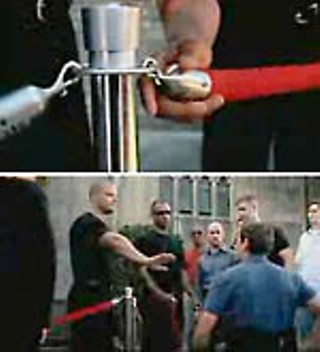TV Eye
Going to Hell
By Belinda Acosta, Fri., Dec. 10, 2004

Last week, CBS and NBC (as well as ABC, according to some accounts) refused a commercial from the United Church of Christ that the networks deemed "too controversial." The commercial – which can be seen online at www.stillspeaking.com – has two beefy bouncers standing outside a velvet-roped church, selecting which people can enter. Those turned away include people of color, a disabled man, and a presumably same-sex couple. Eventually, superimposed screen text reads that "Jesus didn't turn people away. Neither do we." Then, an offscreen narrator closes the scene by saying, "No matter who you are, or where you are on life's journey, you are welcome here."
To explain their decision for declining the ad, CBS issued this statement to the UCC: "Because this commercial touches on the exclusion of gay couples and other minority groups by other individuals and organizations and the fact that the Executive Branch has recently proposed a Constitutional Amendment to define marriage as a union between a man and a woman, this spot is unacceptable for broadcast on [CBS and UPN]." NBC issued a similar response, according to a UCC press release.
I have no particular allegiance to the UCC or any other organized religion. In fact, my disdain for most organized religions is the source of finger-wagging by my mother, who believes I'm going to hell because I don't go to church. Fine. I'm going to hell. But before I get there, let me tell you why the exclusion of this commercial is more frightening to me than any fire and brimstone version of hell.
The UCC ad was the result of market research that found that "many people throughout the country feel alienated by churches." With this information, the UCC ad aims for "those persons who, for whatever reason, have not felt welcomed or comfortable in church." In other words, according to the networks that shunned the ad, inclusion is bad. That, or maybe they believe that those periodic prime-time specials produced by the Billy Graham Evangelistic Association (two scheduled for this month on ABC), is where all those alienated folks should get their churchgoing fix on. Or maybe they assume that religious programming on cable (five networks on Time Warner Digital Cable's 200 series) or the broadcast of local church services on cable access serve the alienated just fine. Maybe. But that's not the message the networks sent. There's plenty of religious expression on TV, but the message promoted by the UCC is not the right kind of expression, even if they do reference Jesus Christ, who, last I heard, was deeply into embracing the least able: the poor, the infirm, the outcast.
Yet, it's the second facet of this story that is truly exasperating. That the networks would make a decision based on the president's proposed constitutional amendment strikes me as the worst kind of censorship. He's not a king to appease. He's a statesman whose job is, among many things, to champion freedom of expression and the separation of church and state. In this political climate and certainly as evidenced by the UCC experience, not to mention the proposed constitutional amendment, these freedoms and separations are becoming alarmingly thin.
In The First Amendment Project film "Poetic License" (see last week's "TV Eye," austin chronicle.com/issues/dispatch/2004-12-03/screens_tveye.html), conservative New York Daily News columnist Stanley Crouch said something breathtaking when discussing the work of Amiri Baraka, the poet whose work is the subject of the film.
"It all comes back to the same thing: that there's a group of people who should be lined up and gotten rid of."
The chilling nature of that comment, coming from an African-American man, apparently confident knowing he would not be one of the "disappeared," comes into keener focus with last week's action by the networks. For a network to decide by omission what is an appropriate place or means of worship is alarming. It's also the worst kind of hypocrisy, when juxtaposed with some of the lurid and violent content the networks carry. And these networks want to decide if the UCC's message is right for me? No, thank you. I don't need to be saved. I need to be informed. The broadcast networks are supposed to serve the public interest, not limit the scope of information. But with last week's UCC action, it's glaringly clear that what needs saving is much bigger than my soul.
Several cable networks will carry the UCC ad, including ABC Family, BET, Hallmark, TV Land, and others.








